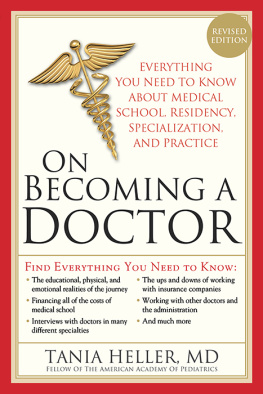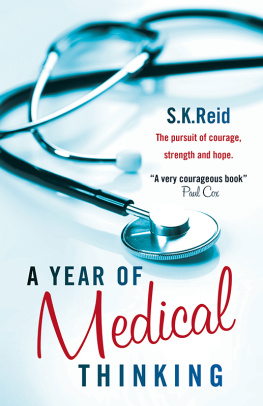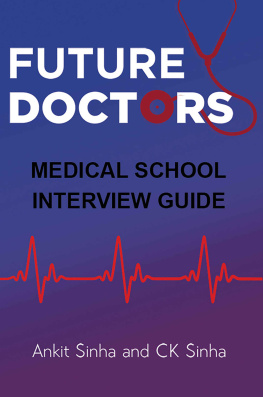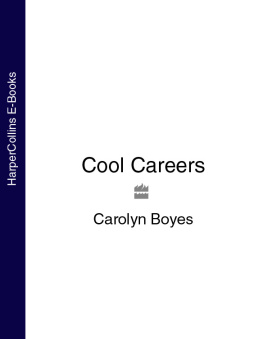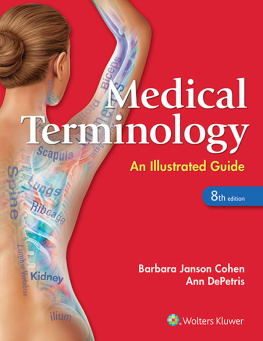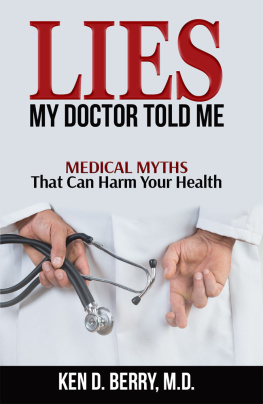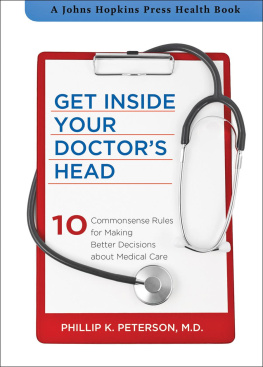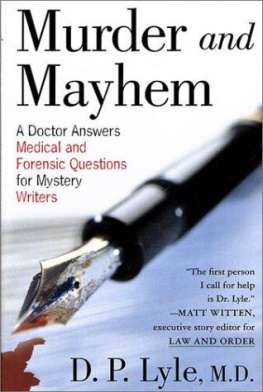Acknowledgements
This book would never have been possible without the help of many kind people and organizations who gave their time and energy for our benefit. In particular:
All the authors of the individual chapters who have produced such lovely vignettes that we both wondered if wed chosen the right specialties.
Dr Chris Ward for the original idea, the first two editions and his ongoing interest and support.
Catherine Barnes from OUP for her continued support and dedication to this book.
Sara Chare from OUP for her help in getting this project started.
Kate Wanwimolruk from OUP for her excellent work as production editor.
Dr Mary Docherty for her input into the prison medicine chapter.
Professor Elizabeth Paice for helping us find the authors for the initial chapters on the organization of medical careers under MMC.
Dr Andrew Long for his three excellent chapters on the organization of medical careers which gave an extremely useful insight into a complicated subject.
Claire Chapman, the General Medical Council (GMC) and Healthcare Knowledge Ltd (creators of http://www.SpecialistInfo.com ) for providing us with data about the number of doctors in each specialty.
The Medical Womens Federation.
Merlin (Medical Emergency Relief International).
Voluntary Services Overseas (VSO).
Finally, anyone who helped us find an author for a chapter of this book.
Three people deserve special mention since their input has been absolutely vital:
Anna Winstanley our loyal and dedicated assistant commissioning editor from OUP who tirelessly sought out chapter authors and answered our endless queries.
Dr Imogen Hart for her grammatical excellence and wise comments on the entire manuscript, along with maintaining the sanity of one of the authors.
Captain Piers Page for proof-reading the entire manuscript.
Career overview
The vast majority of medical careers follow a similar basic pattern, shown in the figure on the opposite page. This chapter describes the main stages of a medical career in greater detail, followed by the main alternatives to the standard medical career, such as academia. The next chapter (specialty overviews, p 26) describes how to pursue a career path in a specific specialty (e.g. paediatrics).
Medical school
To work as a doctor it is essential to have a medical degree. Applications to medical school are made online through the Universities and Colleges Admissions Service (UCAS, http://www. ucas.ac.uk ). There are two main types of medical school:
Undergraduate schools These account for the majority of medical schools; the courses take five to six years, depending on the school and whether there is an intercalated year leading to an extra degree (e.g. BSc). Graduate students, i.e. those who have already completed a university degree, can also apply to these schools.
Graduate schools These are purely for graduate students. The courses are four to five years long and competition for places at these schools is more intense.
Foundation programme (p 6)
At the end of medical school the graduate registers with the General Medical Council (GMC) and becomes a junior doctor. Training continues in salaried jobs within the NHS starting with the two-year foundation programme. All UK medical graduates are guaranteed a foundation job, however they are allocated competitively so that the best doctors get their first choice of location and placements, whilst those with lower-scoring applications might only be offered jobs in regions of the UK they did not choose (see p 55 for more details on this allocation process).
Early specialty training (p 8)
In the second year of the foundation programme doctors must apply for a particular specialty (e.g. general practice, surgery, obstetrics and gynaecology). Application is competitive and this time there is no guarantee of getting a job.
Membership exams (p 10)
These are essential to progress in almost all medical careers. They are difficult to pass and one of the main limiting factors in doctors careers. There is now considerable time pressure to complete these exams and failure to do so may result in the loss of a job and career path.
Further specialty training (p 8)
Depending on the specialty these jobs may be guaranteed or may require another competitive application. At this stage many doctors have to choose a particular specialty or subspecialty. These posts are still new under Modernising Medical Careers (MMC) so there are likely to be changes, probably including the total length of training.
General practitioner (p 12)
This is a final career equivalent to consultant, but based in the community rather than in hospital. General practitioners are responsible for their patients health, acting as their advocate in their interaction with other services. GP partners also run their GP practices as small businesses.
Consultant (p 13)
This is the final career stage of all hospital-based, and some community-based, specialties. The role carries responsibility for the patients, the team members and the department itself.

Foundation programme
After completing medical school, junior doctors start the foundation programme (FP). This typically lasts two years and has replaced the pre-registration house officer year (PRHO) and the first year as a senior house officer (SHO).
F1 year This is a 12-month internship that must include 3 months of medicine and 3 months of surgery. Most jobs feature three placements of four months: medicine, surgery and a specialty, so an example F1 year could include four-month placements in cardiology, vascular surgery and paediatrics. The order of the placements varies.
F2 year These jobs can be in almost any specialty: 80% of FP jobs will include a four-month placement in general practice, usually in the F2 year. Most F2 jobs feature three placements of four months, e.g. anaesthetics, general practice and histopathology.
Applying for foundation programmes
Foundation programme applications take place in the autumn of the final year of medical school through a nationwide online applications service: http://www.foundationprogramme.nhs.uk . The application form features several different components. Many of these are self-explanatory: name, age, education, qualifications, references, etc., however, there are two difficult sections:
Questions There are about seven questions requiring short written answers of 150250 words; they carry the majority of marks on the application form.
Preferences The applicant needs to rank the 26 foundation schools in order of preference. It is not possible to choose specific hospitals or placements at this stagethese will be allocated by the specific foundation school, often using a similar ranking system.
Techniques to help complete this form and to get a high score are discussed on p 62.
Does the specific foundation programme matter for a career?
The main objective of the FP is to ensure that all doctors reach a basic level of competency in being a doctor. All doctors who complete the foundation programme are eligible to apply for any specialty training post (except oral and maxillofacial surgery, which requires a dentistry degree). It is not the end of the world, or end of a career plan, if a particular specialty is not included as a placement. However, medicine is competitive and having spent four months in a specialty is usually an advantage at job interviews.


